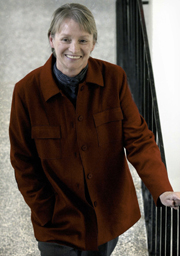
Dolores Pushkar
Photo by Andrew Dobrowolskyj
|
by Eleanor Brown
Dolores Pushkar has started getting those e-mails that promise
eternal youth for a mere few dollars a month.
Growth factor hormone has been shown to help mice and men look younger
and convert fat to muscle while you sleep. “It’s quite true,”
the psychology professor told her grey-haired audience.
However, she added, “We have also learned that it leads to the premature
collapse of the heart and lung system, and to some cancers.”
Anti-aging pills aren’t the answer, Professor Pushkar told the members
of the Concordia University Pensioners Association (CUPA) at their May
2 annual meeting. Rather, we must learn how to age well.
Pushkar, who researches aging at Concordia’s Centre for Research
in Human Development, surveyed the bad old beliefs: that senility is inevitable,
that depression is the appropriate way to react to knowing you’re
old and will die soon. “These stereotypes are still widespread,”
she said, “and are subscribed to by many older people themselves.”
She has heard a 92-year-old refuse to join a social club because it was
full of old people. On the other hand, she has heard 70-somethings boast
about being sleek and spry and young. “A certain amount of self-deception
is good for us,” she admitted. “Age is a matter of lifestyle,
and as long as we can continue to do the things we want to do, we consider
ourselves younger.”
Retirees must accept the fact that they cannot do everything they could
at 20. Instead, it’s about changing what you want to do so you can
do what you want to do at 70. “You’re no longer a killer tennis
player, but you can be happy that you can get out and bang that ball around.
Mentor others. Find substitute actions, don’t stop them completely.”
According to many researchers, advances in health care and community services
mean that oldsters will likely show off their smarts and vigour until
they hit 85 on average. Serious illness and mortality are predicted to
be compressed into a shorter period of time.
And there are benefits to age. Successful seniors deal with stress better,
according to Pushkar. “Older people don’t try to change a situation
[that they have no control over], they do cognitive restructuring and
they change their perception.”
That’s hard advice to follow if the experience is cancer, but Pushkar
said that those in good mental health use the bad times to teach themselves
to appreciate life more, to have an awareness of the joy of living.
Old people also take better care of themselves, refusing to take the emotional
risks that they know will lead to disaster. While a youngster will kiss
a frog and hope for a prince, an older person just sees the frog.
Pushkar said the research shows that seniors must continue to use their
intellect. Smarter people seem to have less chance of coming down with
Alzheimer’s disease, according to recent studies.
Knowledge-based skills, like those of a scholar for his or her field,
tend to remain. (The downside is that perceptual learning responses slow
down, so you’ll never be able to beat a grandchild at saving the
galaxy from computer aliens.)
With no miracle cures for aging on the horizon, we humans are stuck with
the old standbys of exercise (of both brain and brawn), and diet to make
a comfortable life.
“Talking to this group is a very interesting experience for me,”
Pushkar told her rapt audience, “because in two or maybe three years,
I will be joining you.”
The 40-odd assembled CUPA members also gave themselves a pat on the back
for helping create, with university involvement, a $700,000 fund for scholarships
and bursaries. The idea came up two years ago, for the association’s
25th anniversary, but as a much smaller, short-term project. Instead,
members embraced the idea so wholeheartedly that CUPA will award some
$35,000 to students annually and for many years to come, beginning in
September.
CUPA’s next meeting is at 10 a.m. on October 24, in the downtown
Faculty Club, H-767. CUPA membership is $15 annually, and those who would
like to join can contact cuparuc@alcor.concordia.ca
or write VE-328-4, Concordia University, Loyola Campus, 7141 Sherbrooke
St W, Montreal, H4B 1R6.
|
|
|



